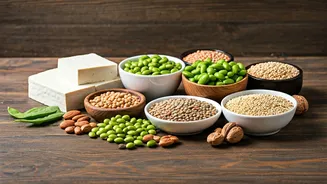Protein Concerns Explored
Vegetarian diets sometimes raise questions about protein, a crucial nutrient for muscle building, repair, and overall health. Concerns often arise regarding
whether vegetarians can consume enough protein and if plant-based sources provide all the essential amino acids. Ensuring a balanced intake of all amino acids is vital, as they are the building blocks of proteins. Insufficient protein intake may lead to fatigue, muscle loss, and other health issues. However, with careful planning, vegetarians can effectively meet their protein needs and achieve optimal health. This involves understanding the available protein-rich foods and strategizing their consumption throughout the day to ensure a balanced intake of all amino acids.
Plant-Based Powerhouses
Numerous plant-based foods are excellent protein sources, making it easy to build a protein-rich vegetarian diet. Consider incorporating these five plant-based powerhouses: first, lentils, which are versatile and provide substantial protein, fiber, and iron, perfect for soups, stews, and salads. Second, tofu, made from soybeans, offers a complete protein and can be used in various dishes, from stir-fries to scrambled 'eggs'. Third, quinoa is a complete protein source, containing all nine essential amino acids, and can be used as a base for meals or added to salads. Fourth, chickpeas, or garbanzo beans, are another excellent choice, providing protein and fiber, making them ideal for snacks, hummus, or curries. Finally, add edamame, young soybeans, which are a complete protein source and can be enjoyed as a snack or in salads.
Boosting Protein Intake
To optimize protein intake on a vegetarian diet, consider the following strategies. First, combine different plant-based protein sources to create complete protein profiles. This means including foods like beans with rice or hummus with whole-wheat pita bread to ensure you get all the essential amino acids. Second, plan your meals to include a protein-rich food at each sitting. This could be adding a handful of nuts to your breakfast cereal, incorporating lentils into your lunch salad, or including tofu in your evening stir-fry. Third, monitor your overall protein intake by keeping a food diary or using a nutrition tracking app to ensure you're meeting your daily needs. Fourth, if you struggle to get enough protein from food alone, consider adding protein supplements like plant-based protein powders to your diet. Fifth, focus on portion sizes; ensuring you consume enough from each protein source is key to achieving your protein goals.
Protein for Overall Wellness
Adequate protein intake plays an integral role in maintaining overall health and wellness for vegetarians. Protein is crucial for muscle repair and growth, supporting physical activity and strength. It also helps in maintaining a healthy weight by promoting satiety and curbing overeating. Furthermore, protein supports a strong immune system and facilitates the production of enzymes and hormones. Ensuring adequate protein consumption can significantly enhance energy levels, improve mental clarity, and boost overall well-being. By focusing on incorporating the right protein sources and making thoughtful dietary choices, vegetarians can experience the various health benefits of protein and lead a vibrant, healthy lifestyle.


















